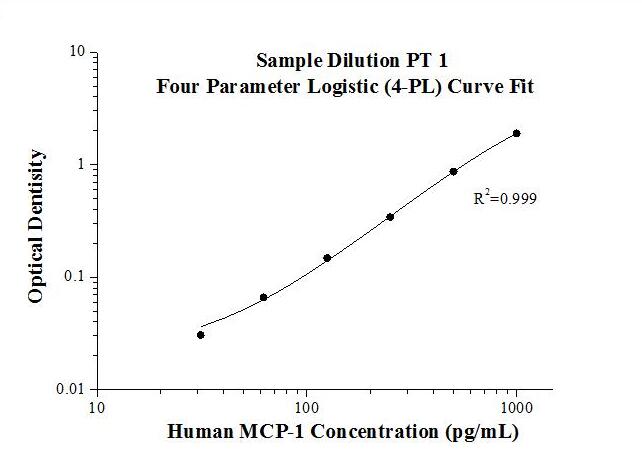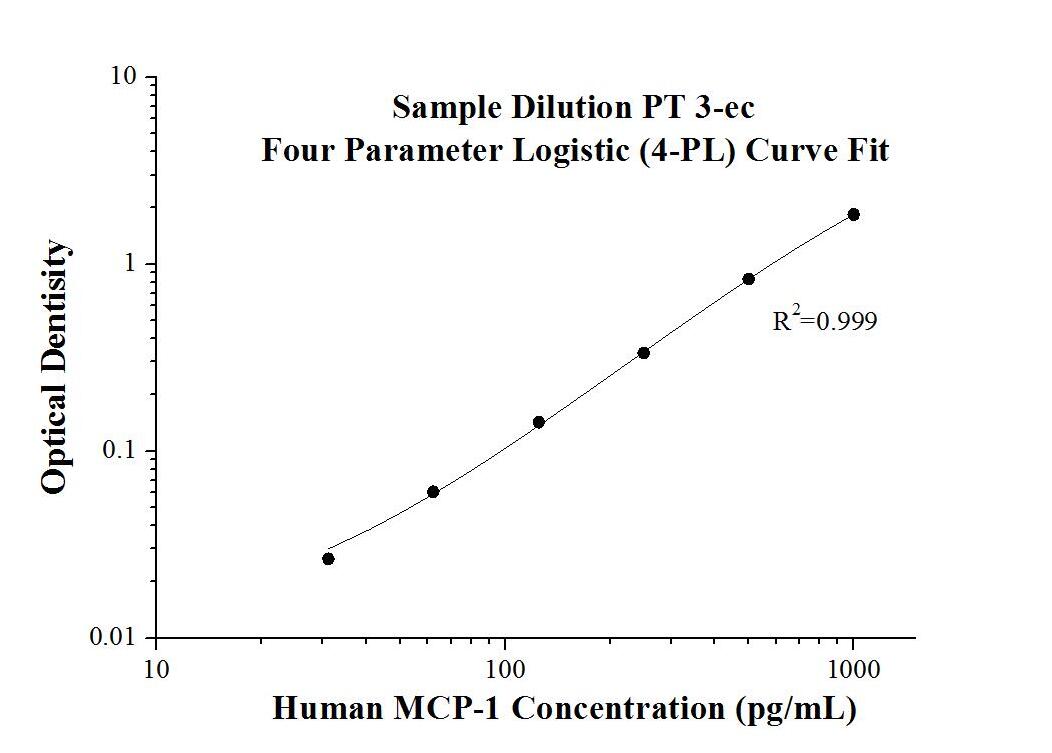Human MCP-1/CCL2 ELISA Kit
Validation Data Gallery
Product Information
KE00091 is a solid phase sandwich Enzyme Linked-Immuno-Sorbent Assay (Sandwich ELISA). The MCP-1 ELISA kit is to be used to detect and quantify protein levels of endogenous MCP-1. The assay recognizes human MCP-1. A monoclonal antibody specific for MCP-1 has been pre-coated onto the microwells. The MCP-1 protein in samples is captured by the coated antibody after incubation. Following extensive washing, a monoclonal antibody of biotinylated specific for MCP-1 is added to detect the captured MCP-1 protein. For signal development, Streptavidin-HRP is added, followed by Tetramethyl-benzidine (TMB) reagent. Solution containing sulfuric acid is used to stop color development and the color intensity which is proportional to the quantity of bound protein is measurable at 450 nm with the correction wavelength set at 630 nm.
| Product name | Human MCP-1/CCL2 ELISA Kit |
| Tests | 1 X 96 well plate |
| Sample type | Serum, Plasma, Cell culture supernatants |
| Assay type | Sandwich |
| Sensitivity | 6.9 pg/mL |
| Range | 31.25-1000 pg/mL |
| Reactivity | Human |
| Tested applications | Sandwich ELISA |
| Gene ID (NCBI) | 6347 |
Recovery
| Sample Type | Average | Range |
|---|---|---|
| Human plasma | 90% | 82%-103% |
| Cell culture supernatants | 102% | 84%-121% |
IntraAssay
| Sample | n | mean ( pg/mL) | SD | CV% |
|---|---|---|---|---|
| 1 | 20 | 1,099.5 | 27.9 | 2.5 |
| 2 | 20 | 295.1 | 16.7 | 5.7 |
| 3 | 20 | 42.5 | 3.9 | 9.4 |
InterAssay
| Sample | n | mean ( pg/mL) | SD | CV% |
|---|---|---|---|---|
| 1 | 24 | 1,075.1 | 41.0 | 3.8 |
| 2 | 24 | 259.8 | 19.3 | 7.4 |
| 3 | 24 | 40.3 | 3.6 | 9.0 |
Background Information
Monocyte chemotactic protein 1 (MCP1; also known as CCL2), is a chemokine that can be expressed in monocytes, macrophages, and endothelial cells, and belongs to the CC subfamily of chemokines. Chemokines are a superfamily of secreted proteins involved in immunoregulatory and inflammatory processes. Research has shown that the expression of MCP1 increases in the serum of patients with acute myocarditis. MCP1 is up-regulated in many types of CNS injury, including ischemia, hemorrhage, trauma, infection, hypoxia, and peripheral nerve axotomy. MCP1 has also been implicated in the pathogenesis of diseases characterized by monocytic infiltrates, such as psoriasis, rheumatoid arthritis, and atherosclerosis.
Properties
| Storage Instructions | All the reagents are stored at 2-8℃ for 6 months or -20℃ for 12 months. Refer to the protocol for further storage instructions. |
| Synonyms | CCL2, MCP1, MCP-1, C C motif chemokine 2, C-C motif chemokine 2 |
Publications
| Species | Sample Type | Title |
|---|---|---|
Adv Sci (Weinh) S100A5 Attenuates Efficiency of Anti-PD-L1/PD-1 Immunotherapy by Inhibiting CD8+ T Cell-Mediated Anti-Cancer Immunity in Bladder Carcinoma | ||
Int J Mol Sci Abiotrophia defectiva DnaK Promotes Fibronectin-Mediated Adherence to HUVECs and Induces a Proinflammatory Response. | ||
Front Cell Dev Biol Molecular and Clinicopathological Characterization of a Prognostic Immune Gene Signature Associated With MGMT Methylation in Glioblastoma. | ||
J Immunol Macrophagic Extracellular Vesicle CXCL2 Recruits and Activates the Neutrophil CXCR2/PKC/NOX4 Axis in Sepsis. | ||
Ecotoxicol Environ Saf In vitro evaluation of nanoplastics using human lung epithelial cells, microarray analysis and co-culture model. | ||
J Cell Biochem Combined application of geranylgeranylacetone and amelogenin promotes angiogenesis and wound healing in human periodontal ligament cells. |



